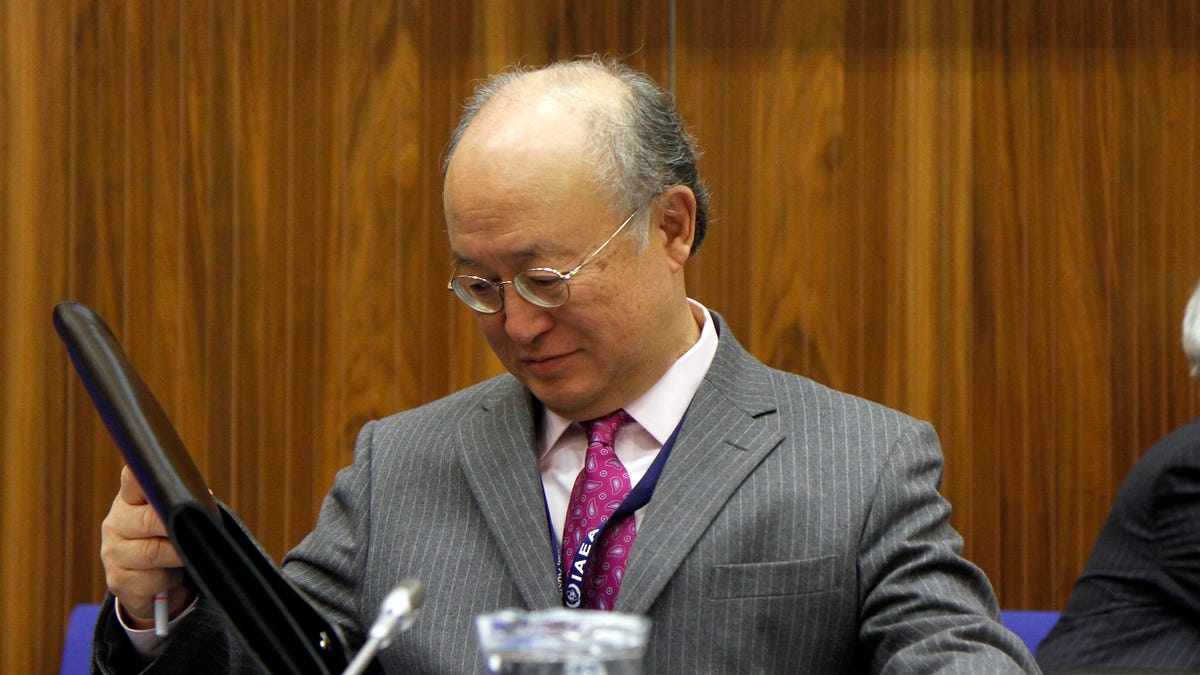
Dec. 3: Director General of the International Atomic Energy Agency, IAEA, Yukiya Amano from Japan, waits for the start of the IAEA's board of governors meeting at the International Center in Vienna, Austria. (AP)
VIENNA – The 35-nation board of the International Atomic Energy Agency approved an IAEA-run repository for nuclear fuel on Friday, in a move meant to limit proliferation by making domestic uranium enrichment programs superfluous.
The new fuel bank, and one run by Russia that went into operation earlier this year, are meant to provide alternatives to nations wanting to develop their own enrichment program to produce fuel for civilian nuclear reactors. Kazakhstan is the most likely candidate, but the location of the new facility has not yet been formally decided.
Because enrichment can also make fissile warhead material, the fuel banks are considered a way to reduce possible nuclear weapons proliferation by making domestic programs superfluous.
Iran is under four sets of U.N. Security Council sanctions for refusing to scrap its enrichment activities.
Nations have a right to enrich domestically and Iran insists it is doing so only to make fuel for an envisaged network of reactors. But international concerns are strong because Tehran developed its enrichment program clandestinely and because it refuses to cooperate with an IAEA probe meant to follow up on suspicions that it experimented with components of a nuclear weapons program — something Iran denies.
Both facilities are meant to ensure a reliable supply of nuclear fuel in case commercial deliveries are interrupted and both were approved by the IAEA board. But because the repository approved Friday will be IAEA run, it is meant to provide additional assurances of impartiality to nations worried about access to nuclear fuel in case they are denied commercial supplies for political reasons.
Glyn Davies, the chief U.S. delegate to the IAEA, described approval as "an important step that will protect the rights of all states to the peaceful uses of nuclear energy (while) ... moving the world toward a world without nuclear weapons."
Still, while 28 nations voted for establishment of the facility, six of those present abstained. That reflected some concerns among developing nations that such fuel banks could impinge on nations' rights to fully develop civilian nuclear programs.
And Ali Asghar Soltanieh, the chief delegate to the IAEA of non-board member Iran, called the still to be stocked and operated facility "a new problem, creating obstacles and political tensions among member states."
That was an allusion to Tehran's exclusion because of doubts about the exclusively peaceful nature of its nuclear program.
A copy of the restricted fuel bank document obtained by the AP says that "the rights of Member States, including establishing or expanding their own production capacity in the nuclear fuel cycle, shall remain intact and shall not in any way be compromised or diminished by the establishment of international assurance of supply mechanisms."
Abstaining were Venezuela, Tunisia, South Africa, Ecuador, Brazil and Argentina. Pakistan, meanwhile formally announced it would not take part in the voting.
Like rival India, nuclear-armed Pakistan has not signed the Nuclear Nonproliferation Treaty but unlike New Delhi it has no access to foreign nuclear technology — a status that in part appeared to dictate its decision not to vote.
The U.S.-based Nuclear Threat Initiative and investor Warren Buffet — who together provided the $50 million (38 million euro) seed money to start up the IAEA facility — welcomed Friday's vote on the plan, sponsored by Washington and co-sponsored by 13 other nations.
An NTI statement described it as a "breakthrough in global cooperation to enable peaceful uses of nuclear energy while reducing the risks of proliferation." Buffet called it "an investment in a safer world."
___
Associated Press writer Rafael Gurbisz contributed to this report.
